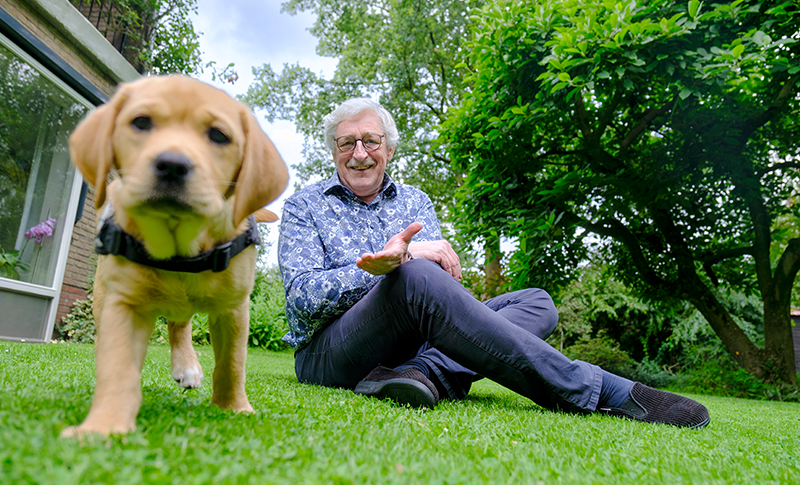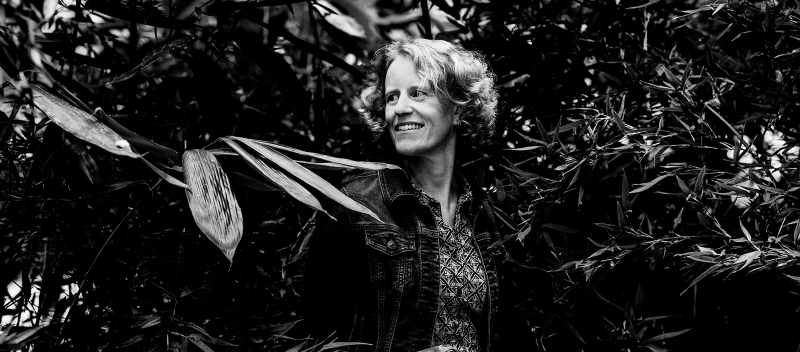He saw over 170 PhD candidates through to the finish line. Now, after a quarter of a century as professor of Plant Breeding, Richard Visser hears his own ‘hora est’ (the traditional ‘it is time’ called at the end of the PhD defence). He will be retiring. Well, kind of…
At the end of the summer, on his birthday on 29 August, Richard Visser will be stepping down as chairholder and head of the combined Plant Breeding group (WU and WR). That is when he turns 67. But don’t assume he will be ‘putting his feet up’. He will start immediately as a project manager on projects in Singapore and China, for two days a week. And of course he still has his PhD candidates. No one in the history of WUR has supervised as many candidates as Visser. The count currently stands at 170 and a further 40 are in the pipeline. ‘That seems a lot,’ he says, ‘but I don’t do the day-to-day supervision in 95 per cent of the cases. That wouldn’t be feasible.’
Richard Visser’s upbringing encouraged an interest in plants from the start. He was born in Arnhem as the son of a market stallholder specializing in flowers and plants. ‘When I was five, we moved to Heerlen. My father mainly worked in Limburg.
Colleagues also complain about the succession process
From the age of ten, I was helping him on the stall.’ But it wasn’t his father’s profession that set him on the path to plant breeding. ‘The real catalyst was a short film I saw in the cinema about propagating orchids. Wow! I thought that was amazing – being able to create thousands of new plants virtually from nothing. I wanted to do that too. I must have been about 13.’
Idiosyncratic
Visser got his degree in Biology at Groningen. That is also where he got his PhD, for a study of the genetic modification of the potato. The molecular genetic study was initially intended for a postdoc and he was supposed to be researching tissue culture, but he refused. ‘I was much more interested in the molecular work. It was also quite a new field at the time.’ He eventually got his way.
When we started studying polyploid crops, lots of people said we were crazy
That idiosyncrasy is typical of Visser. He himself calls it ‘being headstrong in a good way’. ‘I can be quite obstinate. That’s fair enough, but I’m still open to good counterarguments. I’ll be the first to switch if I’m persuaded. But if you disagree with something simply because it’s not what you want, we’ll keep to what I decided.’
After Groningen, Visser moved to Wageningen at the invitation of his former Groningen mentor Evert Jacobsen. ‘He had been appointed professor of Plant Breeding at Wageningen. At that time, plant breeding in Wageningen was still very much along classical lines. He wanted to modernize it with the help of molecular genetics and biochemistry. But he didn’t have much experience with that, whereas I did because I’d set it up in Groningen.’ Visser moved to Wageningen in 1989, became a professor holding a personal chair in 1998 and succeeded Jacobsen as professor in the chair of Plant Breeding in 2004.
At the turn of the millennium, Wageningen was doing badly. ‘There was even talk of splitting Wageningen up with part going to Nijmegen and part to Utrecht,’ says Visser. In a pre-emptive move, the Plant Breeding group was created as a partnership between Wageningen University and Wageningen Research. Visser was involved in the new group’s creation and headed it from the start. The merger was not without its problems. ‘In the early days there was still a lot of us and them. Some people left because they thought the merger was a big mistake. But I think we got through it well. There is real collaboration in both research and education. Plant Breeding is one of the best performing groups in Plant Sciences.’
Cassave and apples
In the past 35 years, Visser has built up an impressive track record. According to the scientific search engine Scopus, he has published 629 articles. In the peak year 2012, he wrote or co-authored 42 papers. That impressive production is partly thanks to the large number of PhD candidates he has supervised. On top of that, he also spent three years as WUR’s Dean of Research. He was involved in deciphering the potato and tomato genomes. Two gems he himself points to were relatively small projects: increasing the shelf life of cassava in Thailand and developing an apple that fewer people are allergic to. ‘This isn’t research that gets into Nature or Science, but I’m still proud of work like this at the interface between plant breeding and social issues.’
He thinks applications are important. ‘Plant breeding is seen as an applied science, but you can still do really basic research in that field. Which we do. Take our research on polyploid crops, ones with more than two copies of each chromosome.
Countries elsewhere in the world are relaxing their rules on genetic modification
When we started on this ten years ago, a lot of people said we were crazy. What are you getting into? That’s far too difficult. Now people from all over the world come to us for help with research on crops of this type.’
Looking back on 35 years of research, Visser concludes that the goals of plant breeding have stayed the same. ‘We still want plants that are better quality, climate-proof and more resistant to disease. But the priorities have shifted. In the past, half the research was focused on resistance to disease and pests. Now we have identified the resistance genes in quite a lot of crops and we know how to introduce those genes in the crop. These days, society wants things like fewer chemicals, more biodiversity, perennial crops, food forests, vertical cultivation and strip cropping. Tailored plant breeding is needed for all these aspects.’
Genetic technology
Genetic techniques such as CRISPR-Cas are useful in this regard, but the EU rules are strict. ‘In theory GMO is allowed, but the rules and guidelines are so complex and laborious that firms don’t dare do it. Fortunately the EU does offer funding for research on genetic modification. So we are still in the game. But many countries elsewhere in the world are relaxing their rules on genetic modification.
In the past, half the research was focused on resistance to disease and pests
Those GMO products end up on the market here too, but it’s very difficult to detect that genetic modification. That is becoming an increasing problem for the checks. That alone is a good reason why some applications of CRISPR-Cas should be allowed.’
Visser will no longer see that happen as a Wageningen scientist. He will be handing over what he believes to be a strong group to his successor. But that is a sore point: a successor has yet to be appointed. A big mistake, thinks Visser. ‘I asked the rector two years ago to make sure to start the process in good time. Since February, I’ve been emailing the directors pretty much weekly but I still haven’t seen a job advert text. Colleagues also complain about their own succession process. Couldn’t WUR organize this a bit better, to get a seamless transition?’
Regardless, Visser will be leaving for good on 29 August. And while he will remain active as a scientist, he will undoubtedly have more free time. For his dog, for example. ‘Two years ago, my wife and I started training dogs for the guide dog organization Hulphond Nederland. The dogs are trained to help with general daily activities or, for example, to support people with PTSD. We recently got a new one.’ And then there are his two grandchildren, and his advisory positions at various companies and institutes. ‘I won’t have trouble filling my days.’

 Richard Visser: ‘Two years ago, my wife and I started training dogs for the guide dog organization Hulphond Nederland. This dog recently joined us.’ Photo Guy Ackermans
Richard Visser: ‘Two years ago, my wife and I started training dogs for the guide dog organization Hulphond Nederland. This dog recently joined us.’ Photo Guy Ackermans 

